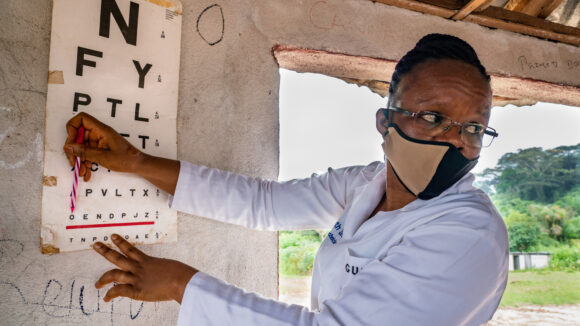Eye health

Going beyond health: the role eye care plays in the SDGs
Eye health has an impact on numerous Sustainable Development Goals, and has a ripple effect that improves gender equity, education, economic and health outcomes.

Why eye health is crucial for universal health coverage
Everyone will require eye care services at some point in life, but universal health coverage cannot be achieved unless everyone, wherever they live, has affordable access to the eye care they need.

Sightsavers partners with children's eyewear brand Speckles
Speckles will be supporting Sightsavers’ eye health projects through annual donations, starting with the School Health Integrated Programming project in Liberia.

Treating cataracts in Zambia: “I know their future is going to be bright”
Cataracts are the world’s leading cause of blindness. On World Sight Day, learn what Sightsavers is doing to protect the sight of children with cataracts in Zambia.

How do you rebuild a health system after decades of instability?
Liberia's National Eye Health Policy will ensure eye health is a priority and help strengthen the wider health system by developing a sustainable, inclusive eye care service.

Sightsavers-trained doctor appointed deputy minister of health in Sierra Leone
Dr Jalikatu Mustapha trained with Sightsavers between 2012 and 2016, becoming the only female ophthalmologist in the country.

Sightsavers Bangladesh marks 50-year anniversary
Sightsavers began working in Bangladesh in 1973 to diagnose and treat people for cataracts, which is one of the most common eye conditions in the country.

VUEAV and VUE Bear partner with Sightsavers to help protect sight
The visual technology company will be donating £10,000 each year towards Sightsavers’ work to help protect sight and fight for disability rights in Africa and Asia.

Frida and Florence to support Sightsavers with sunglasses accessory collection
The eco-friendly jewellery brand has launched a range of sunglasses chains that will be helping to support Sightsavers’ eye health work worldwide.

Sightsavers partnership aims to improve global access to eye care
Sightsavers has partnered with the Fred Hollows Foundation and PlenOptika to pilot a new vision care strategy that aims to revolutionise eye care worldwide.